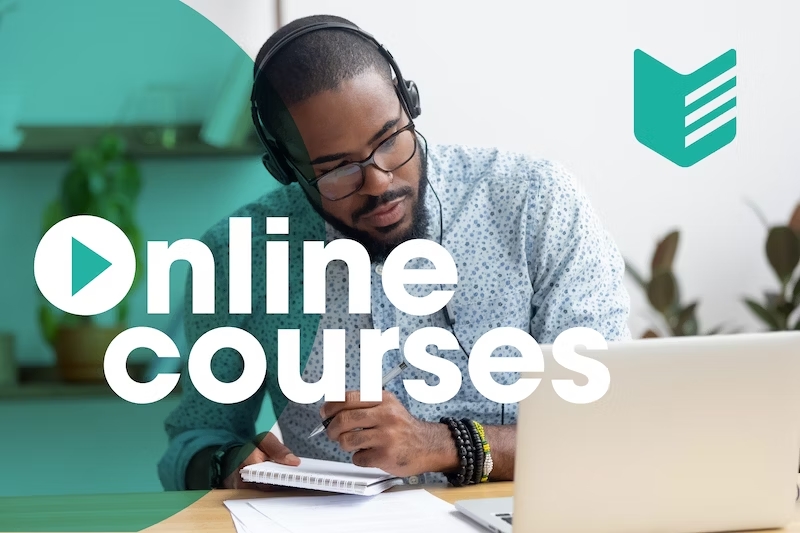In 2024, where continuous learning is key to personal and professional success, online courses for adults have emerged as a game-changer. The convenience, flexibility, and diverse offerings make them attractive for those looking to upskill, reskill, or explore new horizons.
Table of Contents
Top 15 Online Courses for Adult Learners
Here’s a list of the top 15 online courses for adults in 2024, covering various fields:
In-demand skills & career development:

- Python Programming for Everybody Specialization: (Coursera, University of Michigan) – Master the basics of Python, a versatile language for many fields.
- The Complete SQL Bootcamp 2024: (Udemy) – Learn SQL, essential for data analysis and manipulation.
- Google Data Analytics Professional Certificate: (Coursera, Google) – Gain job-ready data analysis skills from Google experts.
- The Complete Digital Marketing Bootcamp 2024: (Udemy) – Master digital marketing fundamentals like SEO, PPC, and social media.
- AWS Certified Solutions Architect – Associate: (A Cloud Guru) – Prepare for this in-demand cloud computing certification.
- CompTIA Cybersecurity+ Certification: (Udemy) – Validate your cybersecurity knowledge for entry-level positions.
Personal growth & creativity:

- Learning How to Learn: (Coursera, McMaster University & University of California, San Diego) – Develop effective learning strategies.
- Writing with Clarity and Style: (Coursera, University of Washington) – Improve your writing skills for various contexts.
- Photography Specialization: (Coursera, University of California, Irvine) – Learn photography fundamentals and techniques.
- The Beginner’s Guide to Investing: (Udemy) – Understand the basics of investing and financial planning.
- Mindfulness for Everyday Life: (edX, University of California, San Diego) – Develop mindfulness practices for stress reduction and well-being.
Specialized interests:

- Introduction to Data Science in Python: (DataCamp) – Explore core data science concepts using Python.
- Machine Learning with Python: (Coursera, Google) – Learn fundamental machine learning algorithms and applications.
- Game Development Fundamentals: (Udemy) – Create basic 2D games using Unity.
- Spanish from Beginner to Conversational: (Memrise) – Learn Spanish through interactive and personalized lessons.
Remember, these are just a starting point. Consider your specific interests, budget, and learning style when choosing your online courses.
Here are some additional tips for finding the right course:
- Check reviews and ratings. See what other learners have to say about the course content and instructor.
- Consider the instructor’s credentials and experience. Choose a course taught by someone with expertise in the subject matter.
- Make sure the course aligns with your goals. What do you hope to achieve by taking the course?
- Read the course syllabus carefully. Understand the topics covered, workload, and assessment methods.
Please note that the popularity and relevance of courses can change over time, so it’s recommended to check the latest reviews and course content before enrolling.
Benefits of Online Courses for Adults

Flexibility in Learning Schedules
One of the primary advantages of online courses is the flexibility they offer in terms of learning schedules. Adults, often juggling multiple responsibilities, appreciate the ability to choose when and where they engage with course materials.
Diverse Course Offerings
Online platforms provide a vast array of courses, allowing adults to pursue subjects that align with their personal or professional interests. Whether it’s acquiring a new skill or delving into a passion, the options are virtually limitless.
Cost-Effectiveness
Traditional education can be expensive, but online courses often come at a fraction of the cost. The affordability factor opens doors for individuals who might otherwise be constrained by financial considerations.
Skill Enhancement Opportunities
Adult learners can focus on specific skills they want to enhance, tailoring their learning experience to meet their unique needs. This targeted approach can lead to more rapid and practical skill development.
Convenience and Accessibility
Online courses eliminate the need for adults to commute to a physical location, saving both time and money. This increased accessibility allows individuals from diverse geographical locations to access high-quality education without the constraints of proximity.
Self-Paced Learning
Many online courses offer a self-paced learning environment, allowing adults to progress through the material at their speed. This accommodates different learning styles and ensures that individuals can dedicate more time to challenging concepts while breezing through familiar ones.
Career Advancement
Online courses provide opportunities for career advancement by allowing adults to acquire new certifications or degrees while still working. This can lead to better job prospects, promotions, or even career transitions into entirely new fields.
Networking Opportunities
Virtual classrooms often facilitate networking with peers and professionals worldwide. Adults can connect with like-minded individuals, share experiences, and build valuable professional relationships, enhancing their overall learning experience and expanding their professional network.
Up-to-Date Content
Online courses are frequently updated to reflect the latest industry trends and advancements. This ensures that adult learners receive current and relevant information, making their education more applicable and valuable in the rapidly evolving job market.
Personalized Learning Experience
Online courses often incorporate various multimedia elements, quizzes, and interactive assignments, providing a more personalized and engaging learning experience. This can be particularly beneficial for adults who prefer diverse learning modalities.
Integration of Technology Skills
Participating in online courses naturally exposes adults to various digital tools and technologies, contributing to the development of essential tech skills. This is crucial in today’s technology-driven workplace, enhancing an individual’s overall employability.
Overall, the benefits of online courses for adults encompass flexibility, affordability, convenience, skill enhancement, career advancement, networking, up-to-date content, and a personalized learning experience. These factors make online education an attractive and viable option for many adult learners.
Choosing the Right Online Course

Identifying Personal and Professional Goals
Before enrolling in an online course, adults should assess their goals—both personal and professional. This self-reflection ensures that the chosen course aligns with their aspirations and contributes to their development.
Researching Reputable Online Platforms
The internet is flooded with online learning platforms. Researching and choosing reputable ones ensure a quality learning experience. Look for platforms with a track record of successful outcomes and positive reviews.
Reading Reviews and Testimonials
Feedback from other learners can be invaluable. Reading reviews and testimonials provides insights into the course structure, teaching methods, and overall satisfaction of past participants.
Considering Accreditation
It’s essential to choose online courses offered by accredited institutions or recognized organizations. Accreditation ensures that the course meets certain quality standards and is widely accepted by employers and educational institutions.
Assessing Course Structure and Format
Different online courses have varying structures and formats. Some may be self-paced, while others follow a set schedule. Understanding the course structure and format is crucial to ensure it aligns with the individual’s preferred learning style and time availability.
Checking Instructor Credentials
The qualifications and experience of the course instructors play a significant role in the quality of education. Check the credentials of the instructors to ensure they have expertise in the subject matter and a proven track record in teaching.
Exploring Course Materials
Review the course materials, including textbooks, online resources, and multimedia components. Ensure that the materials are up-to-date, relevant to the subject matter, and comprehensive enough to provide a thorough understanding of the content.
Understanding Technical Requirements
Online courses often require specific technical tools or software. Ensure that the individual has access to the necessary technology and meets the technical requirements of the course. This may include a stable internet connection, compatible devices, and software installations.
Assessing Support Services
Consider the availability of support services such as technical support, academic advising, and access to resources like forums or discussion groups. Adequate support can significantly enhance the learning experience and help individuals overcome any challenges they may encounter.
Comparing Costs and Financial Aid Options
Compare the costs of different online courses, including tuition fees, additional materials, and any hidden expenses. Additionally, explore financial aid options, scholarships, or payment plans that may be available to make the course more financially feasible.
Trial or Preview Options
Some online platforms offer trial periods or preview options that allow individuals to explore a portion of the course before committing. Take advantage of such opportunities to get a feel for the course content, instructor style, and overall learning experience.
Ultimately, choosing the right online course requires careful consideration of personal and professional goals, researching reputable platforms, reading reviews, checking accreditation, assessing course structure, reviewing instructor credentials, exploring course materials, understanding technical requirements, evaluating support services, comparing costs, and taking advantage of trial or preview options. This thorough approach helps ensure that the selected online course aligns with the individual’s needs and provides a valuable and fulfilling learning experience.
Trends in Online Education for Adults
Microlearning and Bite-Sized Courses
The popularity of microlearning, offering short and focused lessons, is on the rise. Bite-sized courses cater to busy adults, allowing them to absorb information in manageable chunks without feeling overwhelmed.
Integration of Technology
Advancements in technology continue to shape online education. Virtual reality, artificial intelligence, and interactive simulations are being integrated to create immersive learning experiences.
Personalized Learning Paths
Online platforms increasingly leverage data to personalize learning paths. Tailored content and recommendations ensure that adult learners receive a customized educational journey based on their preferences and progress.
Conclusion
In conclusion, online courses for adults present a transformative opportunity for continuous learning and skill development. The flexibility, diverse offerings, and evolving trends in online education cater to the unique needs and preferences of adult learners. Embracing online learning is not just a choice but a strategic investment in personal and professional growth.
